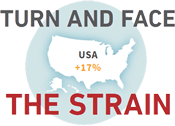
Matthew Ladner, Senior Advisor, Foundation for Excellence in Education, has a new report entitled Turn And Face The Strain: Age Demographic Change And The Near Future of American Education. This report highlights a coming social policy crisis. By 2030, all Baby Boomers will have reached the retirement age of 65 and at the same time there will be a dramatic increase in the K-12 population.
This means that state funding will be even more limited as two large (and important groups) – elderly and k-12 -will be in need of state funds. Matthew Ladner writes that:
The Baby Boom generation is retiring and, at the same time, sending their grandchildren to school. State governments are not prepared to deal with either phenomenon, much less both.
The report goes on to talk about age dependency ratios.
“Economists use “age dependency ratios†as a measure of societal strain. The ratio adds people old enough to exit the workforce with those too young to have entered it, and divides the sum by the number of working age people. Young and elderly people depend upon public spending for education and health care, respectively. High total age dependency ratios lead to slower economic and tax revenue growth while creating higher demands for public health and education spending.
The Census Bureau projects age dependency ratios to increase in all 50 states. In 2010, the age dependency ratio of the United States stood at 59 people elderly or young for every 100 working age people. In 2030, the Census Bureau projects the cart to carry 76 people for every 100 pushing it. Some states will have much larger challenges than others.”
While this is a formidable challenge, the report is not without hope. Matthew Ladner discusses school choice as one option to help address the issues our country will face in the next 15 years. Under this heading of school choice, he lists:
- Digital Blended Learning
- Outcome-Based Funding
- Charter Schools
- Education Savings Accounts
These are, of course, just a few topics under the umbrella of school choice (which also includes private school, homeschool, and more!) Ladner identifies empowering parents as a priority, writing:
An obvious priority is customizing education in a way that empowers parents with a marketplace of education choices, allowing parents to pick the best options for their children. The resulting competition will improve results and incentivize cost savings”
In other words, #trustparents.
To read the whole report or to see the policy brief, click here.
So remember the words of the lyrical poet David Bowie,
Pretty soon now you’re gonna get a little older
Time may change me
But I can’t trace time

